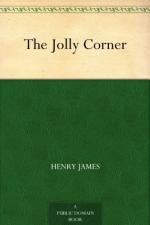It amused, it verily quite charmed him; and, by the same stroke, it amused, and even more, Alice Staverton, though perhaps charming her perceptibly less. She wasn’t, however, going to be better-off for it, as he was—and so astonishingly much: nothing was now likely, he knew, ever to make her better-off than she found herself, in the afternoon of life, as the delicately frugal possessor and tenant of the small house in Irving Place to which she had subtly managed to cling through her almost unbroken New York career. If he knew the way to it now better than to any other address among the dreadful multiplied numberings which seemed to him to reduce the whole place to some vast ledger-page, overgrown, fantastic, of ruled and criss-crossed lines and figures—if he had formed, for his consolation, that habit, it was really not a little because of the charm of his having encountered and recognised, in the vast wilderness of the wholesale, breaking through the mere gross generalisation of wealth and force and success, a small still scene where items and shades, all delicate things, kept the sharpness of the notes of a high voice perfectly trained, and where economy hung about like the scent of a garden. His old friend lived with one maid and herself dusted her relics and trimmed her lamps and polished her silver; she stood oft, in the awful modern crush, when she could, but she sallied forth and did battle when the challenge was really to “spirit,” the spirit she after all confessed to, proudly and a little shyly, as to that of the better time, that of their common, their quite far-away and antediluvian social period and order. She made use of the street-cars when need be, the terrible things that people scrambled for as the panic-stricken at sea scramble for the boats; she affronted, inscrutably, under stress, all the public concussions and ordeals; and yet, with that slim mystifying grace of her appearance, which defied you to say if she were a fair young woman who looked older through trouble, or a fine smooth older one who looked young through successful indifference with her precious reference, above all, to memories and histories into which he could enter, she was as exquisite for him as some pale pressed flower (a rarity to begin with), and, failing other sweetnesses, she was a sufficient reward of his effort. They had communities of knowledge, “their” knowledge (this discriminating possessive was always on her lips) of presences of the other age, presences all overlaid, in his case, by the experience of a man and the freedom of a wanderer, overlaid by pleasure, by infidelity, by passages of life that were strange and dim to her, just by “Europe” in short, but still unobscured, still exposed and cherished, under that pious visitation of the spirit from which she had never been diverted.




